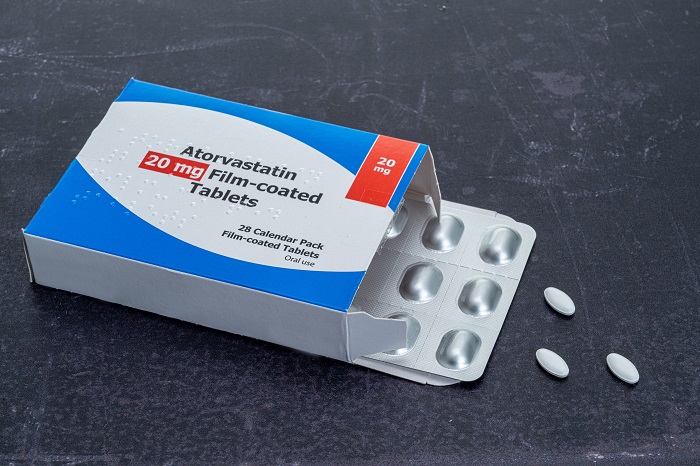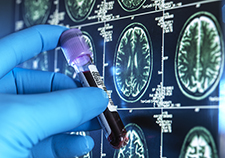Office of Research & Development |
 |
Multiple sclerosis (MS) is a complex neurologic disease that affects the central nervous system, including the brain, spinal cord, and vision pathways. In MS, the immune system attacks the myelin sheath, the fatty tissue that surrounds and protects nerve fibers, as well as the nerve fibers themselves.
Damage from these attacks is called demyelination, and the scar tissue that develops when myelin is damaged is called sclerosis. This scar tissue is also known as lesions or plaques. When any part of the myelin sheath or nerve fiber is damaged or destroyed, nerve impulses traveling to and from the brain and spinal cord are distorted or interrupted, causing a wide variety of symptoms.
Sometimes the myelin can repair itself and the MS symptoms go away after the immune attack. Over time, however, the myelin and underlying nerve fibers cannot recover and suffer permanent damage. This may lead to a gradual decline in function, depending on the disease course. The cause of MS is currently unknown.
Symptoms of MS vary depending on the location of the lesions in the brain and spinal cord. They may include tingling, numbness, painful sensations, slurred speech, and blurred or double vision. Some people experience muscle weakness, poor balance, poor coordination, muscle tightness or spasticity, tremors, or temporary or permanent paralysis. Problems with bladder, bowel, sexual function, or mood (especially depression and anxiety) are also very common.
Fatigue is a major concern for most people with MS, as are challenges with memory, attention, and concentration. Symptoms may come and go, appear in any combination, and be mild, moderate, or severe.
Many symptoms are very responsive to self-care lifestyle changes such as increased activity. Fatigue, insomnia, mood, cognition, mobility, spasticity, and bowel function may all be improved through regular physical activity. In addition, medication therapies and other interventions are available to help manage MS symptoms.
While some neurological diseases, such as amyotrophic lateral sclerosis, have been associated with military service, this relationship has not been seen with MS. However, Veterans who develop symptoms of MS while in the military, or within seven years of their honorable discharge, may be eligible to receive service-connected disability compensation. Medical care for Veterans with MS, whether or not their illness was service-connected, can include disease modifying therapies, other medications, physical and occupational therapy, and other health care services and medical equipment.
VA researchers are addressing a variety of MS care needs and disease management of Veterans with MS. Current research includes investigations into the biology of MS; targets for intervention; impacts of spasticity; fatigue and fall management programs; health services and the delivery of care to evaluate and improve mood and fatigue; and telehealth interventions to improve access to care and symptom management, among others.
For more information on multiple sclerosis, visit our Gulf War Veterans and Health Care Delivery, topic pages.
VA's Multiple Sclerosis Centers of Excellence (MSCoE) are dedicated to furthering the understanding of MS and its impact on Veterans, and developing effective treatments to help manage the disease and its symptoms. MSCoE-East is located in Baltimore, Maryland, and MSCoE-West is jointly located in Seattle, Washington, and Portland, Oregon. VA has also established a national integrated network of dedicated MS health care professionals for care and referrals within the VA health care system. A map providing locations of VA MS clinics in every state can be found here.
MSCoE maintains a national MS Data Repository. The repository contains VA medical data for every patient diagnosed with MS since 1999—more than 46,000 unique and dedicated cases. It is the largest collection of information on men with MS in the world. Men comprise more than 80 percent of the repository, with an average age in the mid-50s.
Partial histocompatibility complex molecules may be an effective MS treatment—Major histocompatibility complex (MHC) molecules are important in initiating immune responses in the body. In mice and related rodents, experimental autoimmune encephalomyelitis (EAE) is a similar illness to MS. In a 2017 study, VA researchers found that administering partial MHC (pMHC) molecular constructs to rodents not only reduced the severity of the disease but also markedly reduced demyelination and damage to axons in the central nervous system. They also found that the effective dose of those constructs is sex dependent and might be regulated by estrogen signaling.
While pMHC was already known to be an effective treatment for EAE, the study suggests the proper dosages to be used on mice and will assist in the design of future clinical trials of the construct.
Cytokines found in progressive MS identified—Researchers with the VA Portland Health Care System, the Oregon Health and Science University, Yale University, and the University of California, San Francisco, published a paper in 2017 in which they identified two related cytokines and associated genetic markers that may explain why some people develop MS. (Cytokines are small, specific proteins released by cells that have a specific effect on the interactions and communications between cells.)
The two cytokines, macrophage migration inhibitory factor (MIF) and D-dopachrome tautomerase (D-DT), can worsen MS by increasing inflammation within the central nervous system. The research team also identified two genetic markers that enhance the expression of both cytokines that occurred more frequently in MS patients with the progressive form of the disease, suggesting that a simple genetic test could be used to identify patients at risk of developing this form of MS.
The finding may open the door to the use of precision medicine to prevent and treat the progressive form of the disease.
Lipoic acid may stop brain atrophy—Lipoic acid, also known as alpha lipoic acid, is an antioxidant made by the body that helps turn glucose into energy. A version is sold as a dietary supplement, over the counter, at drug stores. A two-year trial by researchers at the VA Portland Health Care System and Oregon Health and Science University was completed in 2017. Researchers found that, in a double-blind study involving 51 participants, high doses of lipoic acid significantly slowed the rate of brain atrophy in patients with secondary progressive MS compared to a placebo. In addition, the pilot study suggested improved walking times and fewer falls among study participants who took a daily dose of lipoic acid compared with those who received the placebo.
The research team is using the findings from this pilot trial to design an expanded multi-site clinical trial that has not yet begun.
Functional electrical stimulation improves walking in MS patients—According to the National Multiple Sclerosis Society, 93 percent of patients with MS suffer gait impairment within 10 years of their diagnosis, and 13 percent report they are unable to walk twice a week. Researchers at the Advanced Platform Technology and Functional Electrical Stimulation centers at the Louis Stokes Cleveland VA Medical Center used functional electrical stimulation (FES) techniques to help a patient with MS, and another who had suffered a stroke, to effectively walk. (FES is a technique that uses low energy electrical pulses to artificially generate body movements in individuals who have been paralyzed due to injury to the central nervous system.)
Results of the 90-day study were published in 2017, and the patient with MS who received the FES system said that at the beginning "I could barely take two steps," and "at the end, I was walking down the hallway." The research team hopes to continue their explorations in this area.
Study promoting TREGS underway—Regulatory T cells (TReg cells, or TREGS) are a special subset of T cells in the body that prevent other immune cells from attacking the body's own tissues and other harmless environmental materials, such as food. Defects in regulatory T cells cause severe inflammatory disease.
The VA Maryland Health Care System and the University of Maryland began, in 2017, a study to promote TREGS that control disease, and will explore strategies to use TREGS to control MS with a vaccine-like specificity that keeps the rest of the immune system functional. Conventional treatments for MS often compromise the immune system, leaving patients vulnerable to infection. The study is scheduled to be completed in 2021.
Evidence lacking for benefits of medical marijuana—In 2017, researchers from the VA Portland Health Care System and Oregon Health and Science University reviewed 75 publications on the effects of medical marijuana for many types of chronic pain.
They found limited evidence that marijuana use might alleviate neuropathic pain in some patients, and that it might reduce spasticity associated with multiple sclerosis. There was insufficient evidence on the benefits of marijuana for all other pain types. Between 45 and 80 percent of those who seek medical marijuana do so for pain management.
Current federal law prohibits the use or dispensing of marijuana use. As a federal agency, VA follows this prohibition and does not prescribe medical marijuana to any of its patients.
Depressive disorders and symptoms are common—Depressive disorders and symptoms are extremely common among those with MS. They contribute to overall disease burden and detract from quality of life. A team from the Portland VA recommended, in a 2016 study, that routine screening for depression, including suicidality, should be part of ongoing management of the illness.
According to the team, the most useful treatment for depression in MS patients appears to be the use of individual therapy, especially cognitive behavior therapy, a goal-oriented treatment whose goal is to change patterns of thinking or behavior that are behind people's difficulties and so change the way they feel. The team also found that anxiety disorders and bipolar disorder occur at a lesser frequency than depression, but providers should be aware of the potential need for psychiatric assessment and follow-up.
Misdiagnosis of MS is a common problem—In a study published in 2016, VA researchers and researchers from other academic MS centers submitted data on 110 individual patients they had evaluated and determined to have been misdiagnosed with MS. An important cause of these misdiagnoses was the misinterpretation and misapplication of MS clinical and radiographic (images produced by radiation) diagnostic criteria.
The research team concluded that MS misdiagnosis is a common problem that may lead to treatment-related illness as well as psychosocial illnesses.
Methylphenidate use in MS called into question—Many physicians prescribe the drug methylphenidate (sold commercially as Ritalin by Novartis and under other brands) to their patients with MS to relieve fatigue or improve balance and gait in their patients with MS. A study by researchers with the VA Portland Health Care System and the Oregon Health Science University looked at 24 persons with MS between the ages of 20 to 65 with poor balance and walking difficulties. Half received a placebo, and the others received escalating doses of methylphenidate over a six-week period.
The researchers found that while average performance in tests of walking, balance, and fatigue improved in both groups, greater improvements were found in those receiving placebo than any dose of methylphenidate. They also calculated a 60 percent probability of harmful effects of methylphenidate at any dose, compared to placebo.
Telephone counseling effective in reducing MS fatigue and depression—Researchers with the VA Multiple Sclerosis Center of Excellence at the VA Puget Sound Health Care System looked at 64 people with MS in a study published in 2016. The individuals received either telephone counseling or self-directed physical activity education. Those receiving education only were given advice to increase their physical activity and a DVD with examples of in-home exercises. Those receiving telephone counseling also received mailed graphic feedback, six telephone counseling sessions, and telehealth home monitoring to track their progress over a six-month period.
Those receiving counseling reported significantly reduced fatigue and depression and increased physical activity relative to those receiving education only. Nearly all participants completed all of the telephone sessions, and all rated the sessions as "highly successful." The researchers concluded that telephone-based counseling, combined with home monitoring, is a promising way to improve physical activity and treat fatigue and depression in MS patients.
Another 2016 study by researchers with the VA Puget Sound Healthcare System found that providing monthly telephone-administered calls for six months to Veterans with MS to monitor their medication use helped to ensure that these Veterans were continuing to take their medications properly. Their results offer an efficient method to detect and provide support for those with MS who may benefit from interventions to promote their medication adherence.
Modifiable risk factors for MS—Because the clinical course of MS varies among different people, there may be risk factors that can be modified in individuals that could slow the progress of the disease. Researchers with VA and the Rand Corporation looked at 59 previous studies to see whether such factors existed. The team found, in a study published in 2017, that the progression of MS was consistently associated with low vitamin D levels in patients, and that people who smoked became disabled more rapidly than those who did not.
They also found that there was no association of MS progression with the use of epidural analgesics during childbirth delivery, and that there was not sufficient evidence available to draw conclusions for 11 other risk factors.
Risk of MS not greater in Gulf War deployed individuals—The oil fires, chemical weapons, and infectious diseases that Veterans of the 1990–1991 Gulf War were exposed to have led to hypotheses that deployment during that war was a risk factor for MS. In 2014, researchers led by a team with the Washington, DC VA Medical Center looked at the health records of all active-duty military and activated Reserve and National Guard members who served between Aug. 1, 1990, and Dec. 31, 1991.
Among the 696,118 personnel deployed to the Gulf, 387 developed MS. Of the 1,786,215 nondeployed service members, 1,457 cases were found, meaning that deployed personnel had about two-thirds the risk of developing MS, compared with nondeployed individuals. In addition, Marines had half the rate of other services, yet they had the longest deployments and were most likely to be deployed. Personnel exposed to nerve agents had a slightly higher rate of developing MS, but that rate was not statistically significant.
Methylphenidate is likely less effective than placebo for improving imbalance, walking, and fatigue in people with multiple sclerosis. Cameron MH, McMillan G. In a six-week, double-blind, randomized controlled trial pilot study, escalating doses of oral methylphenidate were less effective than placebo on balance, walking, and fatigue in MS. Mult Scler. 2017 Nov;23(13):1799-1801.
MIF and D-DT are potential disease severity modifiers in male MS subjects. Benedek G, Meza-Romero R, Jordan K, Zhang Y, Nguyen H, Kent G, Li J, Siu E, Frazer J, Piecychna M, Du X, Sreih A, Leng L, Wiedrick J, Caillier SJ, Offner H, Oksenberg JR, Yadav V, Bourdette D, Bucala R, Vandenbark AA. Two related cytokines and associated genetic markers may explain why some people develop MS. Proc Natl Acad Sci USA. 2017 Oct 3;114(40):E8421-E8429.
The effects of Cannabis among adults with chronic pain and an overview of general harms: a systematic review. Nugent SM, Morasco BJ, O'Neil ME, Freeman M, Low A, Kondo K, Elven C, Zakher B, Motu'apuaka M, Paynter R, Kansagara D. Limited evidence suggests that cannabis may alleviate neuropathic pain in some patients, but insufficient evidence exists for other types of chronic pain. Ann Intern Med. 2017 Sep 5;167(5):319-331.
Feasibility of restoring walking in multiple sclerosis with multichannel implanted electrical stimulation. Selkirk SM, Kobetic R, Lombardo LM, Pinault G, Triolo RJ. A case study supports further exploration into the potential benefits of an implanted pulse generator to ameliorate gait dysfunction and improve quality of life for people with MS. Am J Phys Med Rehabil. 2017 Sep;96(9):e170-e172.
Lipoic acid in secondary progressive MS: a randomized controlled pilot trial. Spain R, Powers K, Murchison C, Heriza E, Winges K, Yadav V, Cameron M, Kim E, Horak F, Simon J, Bourdette D. The antioxidant lipoic acid holds promise in improving patients' lives. Neurol Neuroimmunol Neuroinflamm. 2017 Jun 28;4(5):e374.
Sex-dependent treatment of chronic EAE with partial MHC class II constructs. Benedek G, Chaudhary P, Meza-Romero R, Calkins E, Kent G, Offner H, Bourdette D, Vandenbark AA. Male and female mice can be effectively treated for EAE, a disease similar to MS in humans, with different doses of pMHC. J Neuroinflammation. 2017 May 6;14(1):100.
A systematic review of modifiable risk factors in the progression of multiple sclerosis. Hempel S, Graham GD, Fu N, Estrada E, Chen AY, Miake-Lye I, Miles JN, Shanman R, Shekelle PG, Beroes JM, Wallin MT. MS progression is continually associated with low vitamin D levels, and smoking is associated with a more rapid decline in MS disability. Mult Scler. 2017 Apr;23(4):525-533.
Mental health comorbidity in MS: depression, anxiety, and bipolar disorder. Turner AP, Alschuler KN, Hughes AJ, Beier M, Haselkorn JK, Sloan AP, Ehde DM. Among individuals with MS, mental health comorbidities play a significant role in contributing to secondary disability and detracting from quality of life. Curr Nerol Neurosci Rep. 2016 Dec;16(12):106.
Rituximab for treating multiple sclerosis: off-label but on target. Bourdette D. Neurologists have successfully used rituximab off-label to treat neuroimmunologic diseases. Neurology. 2016 Nov 15;87(20):2070-71.
Neurologists and the economics of MS treatment: lighting candles, not cursing the darkness. Bourdette D, Whitham R. In 2013, the average wholesale price of all MS disease-modifying therapies clustered around $65,000 a year, and prices continue to increase by more than 10 percent per year. In response, insurance companies and specialty pharmacies create rules regulating coverage of treatments with little input from neurologists. Neurology. 2016 Oct 11;87(15):1532-1533.
The contemporary spectrum of multiple sclerosis misdiagnosis: a multicenter study. Solomon AJ et al. Misdiagnosis of MS leads to unnecessary and potentially harmful risks to patients. Misinterpretation and misapplication of MS clinical and radiographic diagnostic criteria are important contemporary contributors to misdiagnosis. Neurology. 2016 Sep 27;87(13):1393-9.
Postural motor learning deficits in people with MS in spatial but not temporal control of center of mass. Gera G, Fling BW, Van Ooteghem K, Cameron M, Frank JS, Horak FB. People with MS have the capacity to improve their postural strategy with practice, and can retain their learned behavior for temporal control, but not spatial control. Neurorehabil Neural Repair. 2016 Sep;30(8):722-30.
US health insurance is an obstacle to disease-modifying treatments in MS. Bourdette D, Patti F. U.S. neurologists need to speak out about the unfettered rise of MS disease-modifying therapy prices and the obstacles to care created by insurance companies and specialty pharmacies. Neurology. 2016 Jul 26:87(4):346-7.
Improving fatigue and depression in individuals with multiple sclerosis using telephone-administered physical activity counseling. Turner AP, Hartoonian N, Sloan AP, Benich M, Kivlahan DR, Hughes C, Hughes AJ, Haselkorn JK. Telephone-based counseling with home monitoring is a promising modality to improve physical activity and treat fatigue and depression. J Consult Clin Psychol. 2016 Apr;84(4):297-309.
Predicting medication adherence in multiple sclerosis using telephone-based home monitoring. Turner AP, Roubinov DS, Atkins DC, Haselkorn JK. Brief, telephone-based assessments of adherence expectations may represent an easy and efficient method for monitoring medication use among individuals with MS. Disabil Health J. 2016 Jan:9(1):83-9.
Multiple sclerosis in Gulf War era Veterans. 2. Military deployment and risk of multiple sclerosis in the first gulf war. Wallin MT, Kurtzke JF, Culpepper WJ, Coffman P, Maloni H, Haselkorn JK, Mahan CM. Military deployment to the first Gulf War was not a risk factor for developing MS. Neuroepidemiology. 2014;42(4):226-34.

Download PDF
 Could cholesterol medicine reduce dementia risk in seniors?
Could cholesterol medicine reduce dementia risk in seniors?
 VA study reveals dementia risks unique to people with African ancestry
VA study reveals dementia risks unique to people with African ancestry
 Head trauma, PTSD may increase genetic variant's impact on Alzheimer's risk
Head trauma, PTSD may increase genetic variant's impact on Alzheimer's risk
Scientists discover genetic markers for severe form of multiple sclerosis, Oregon Health Sciences University News, Sep. 18, 2017
Study uncovers markers for severe form of multiple sclerosis, Yale News, Sep. 18, 2017
Patients with multiple sclerosis may benefit from over-the-counter therapy, Oregon Health Sciences University News, July 3, 2017
Stroke, MS patients walk significantly better with neural stimulation, The Daily (Case Western Reserve University), May 11, 2017
Stimulants not helpful in MS fatigue, Feb. 9, 2017, MD Magazine
University of Maryland and VA to investigate Tregs as possible MS treatment, Multiple Sclerosis News Today, Jan. 24, 2017
UMD, VA Maryland Health Care System collaborate on MS Research, University of Maryland News, Jan. 19, 2017